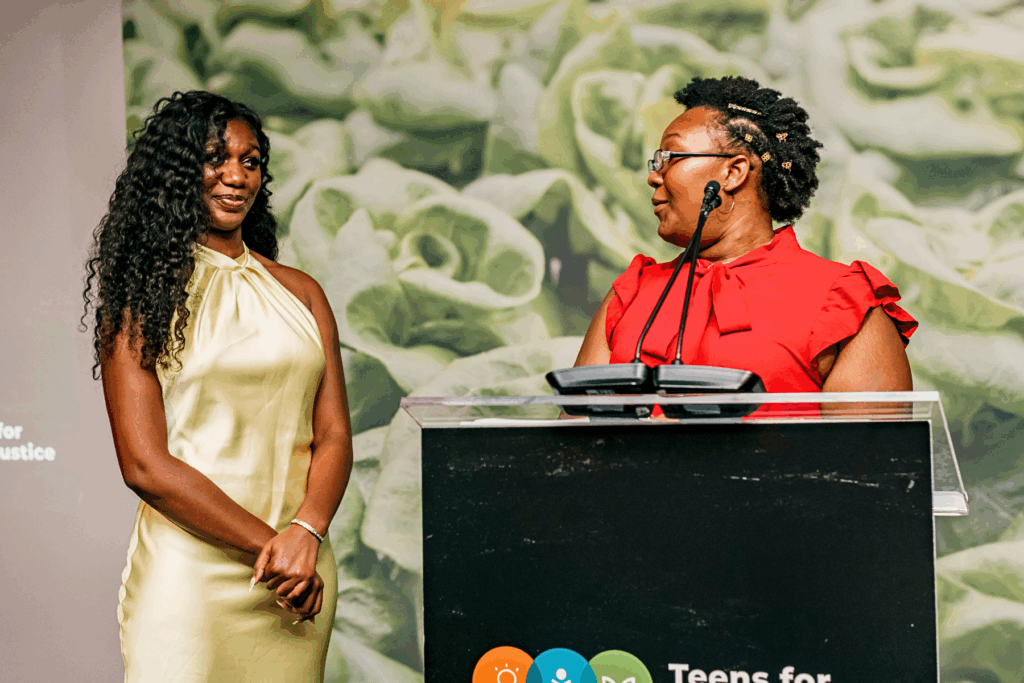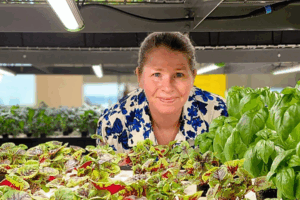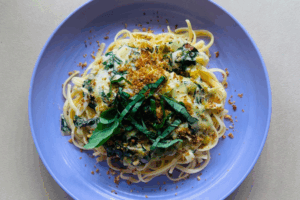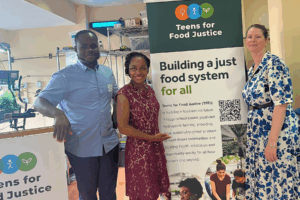By: Pamela Honey
How TFFJ Works: Through the Eyes of Kaity T. and Najae S.
When Kaity T. and Najae S., both seniors at Urban Assembly Maker Academy in the Murry Bergtraum Educational Campus, took the stage at the Teens for Food Justice 2025 Gala. They brought the audience directly into their world—the world of student-run hydroponic farms transforming New York City schools and communities.
Both Kaity and Najae came to the Gala with real experience behind them. They’ve spent time learning, farming, and leading within TFFJ’s program—seeing firsthand how food grown inside classrooms can change how students think, eat, and connect with their communities.
Joining them on stage was Miguel G., a TFFJ alumn from DeWitt Clinton High School and aspiring chef, who shared how his own time in the program shaped his path after graduation. While Miguel reflected on what it means to carry TFFJ’s lessons into life beyond school, the spotlight in this piece belongs to Kaity and Najae—two current students showing how the program works day to day, and how it continues to grow new leaders each year.
Learning by Doing
Kaity began by describing what daily life inside a TFFJ farm looks like—how science, teamwork, and responsibility come together in one living classroom.
“We learn to measure nutrients, check water flow, maintain the equipment, manage planting schedules, harvest crops, and track all the data,” she explained.
When she first joined, Kaity admitted she had never imagined herself farming. “I’d always known the farm was there, but never really thought it was for me,” she shared. That changed once she began seeding and harvesting—work she found unexpectedly calming and rewarding. “The farm changed how I see myself. I’ve never been what you might call ‘outdoorsy,’ so I just assumed farming wasn’t for me. But TFFJ taught me to stay open, to try new things, and to learn from them.”
“The farm changed how I see myself. I’ve never been what you might call ‘outdoorsy,’ so I just assumed farming wasn’t for me. But TFFJ taught me to stay open, to try new things, and to learn from them.”
Through the farm, Kaity has gained hands-on experience in STEM while building leadership skills that carry beyond the classroom. Farming, she shared, happens during the school day and after hours through clubs and projects that reflect each student’s curiosity and creativity.
For her, one of the most meaningful parts has been the friendships that grow alongside the plants. Working side by side with classmates has built a sense of community rooted in shared purpose—feeding others and learning together.
Turning Learning Into Action
When Najae took the microphone, she carried that message forward, showing how TFFJ students turn knowledge into advocacy and impact.
“Through our work with TFFJ, students like us learn how to advocate for healthier food systems in our schools and neighborhoods,” she said.
Their harvests reach far beyond their classrooms. The food they grow appears in school salad bars, goes home with families in produce bags, and is shared with local food pantries and senior centers. Every head of lettuce and bunch of bok choy becomes part of a much larger effort to fight food insecurity.
For Najae, this work connects to something deeply personal. She comes from a family of farmers from the South, and learning to grow hydroponically in New York City gave her a bridge between generations—a new way to honor her family’s roots while shaping her own future. “The farm pushed me to be creative and adventurous with food,” she said. “That’s what I most love about TFFJ—it expands your imagination.”
“The farm pushed me to be creative and adventurous with food,” she said. “That’s what I most love about TFFJ—it expands your imagination.”
Like Kaity, she’s spent years nurturing crops and confidence on the farm, turning classroom learning into real-world change.
Students at the Center
Together, Kaity and Najae painted a clear picture of what makes Teens for Food Justice unique. It’s not just about technology or farming—it’s about students leading real solutions to real problems in their own communities.
By explaining how TFFJ works from the inside, they showed the audience exactly why this model matters. It builds confidence, skills, and purpose—and it gives young people the tools to feed their communities and reimagine what food justice can look like in public schools.❦
Watch their full Gala speech and see how they brought the story of TFFJ’s student-led farms to life on stage:
Pamela Honey is the Communications & Content Coordinator at Teens For Food Justice.





